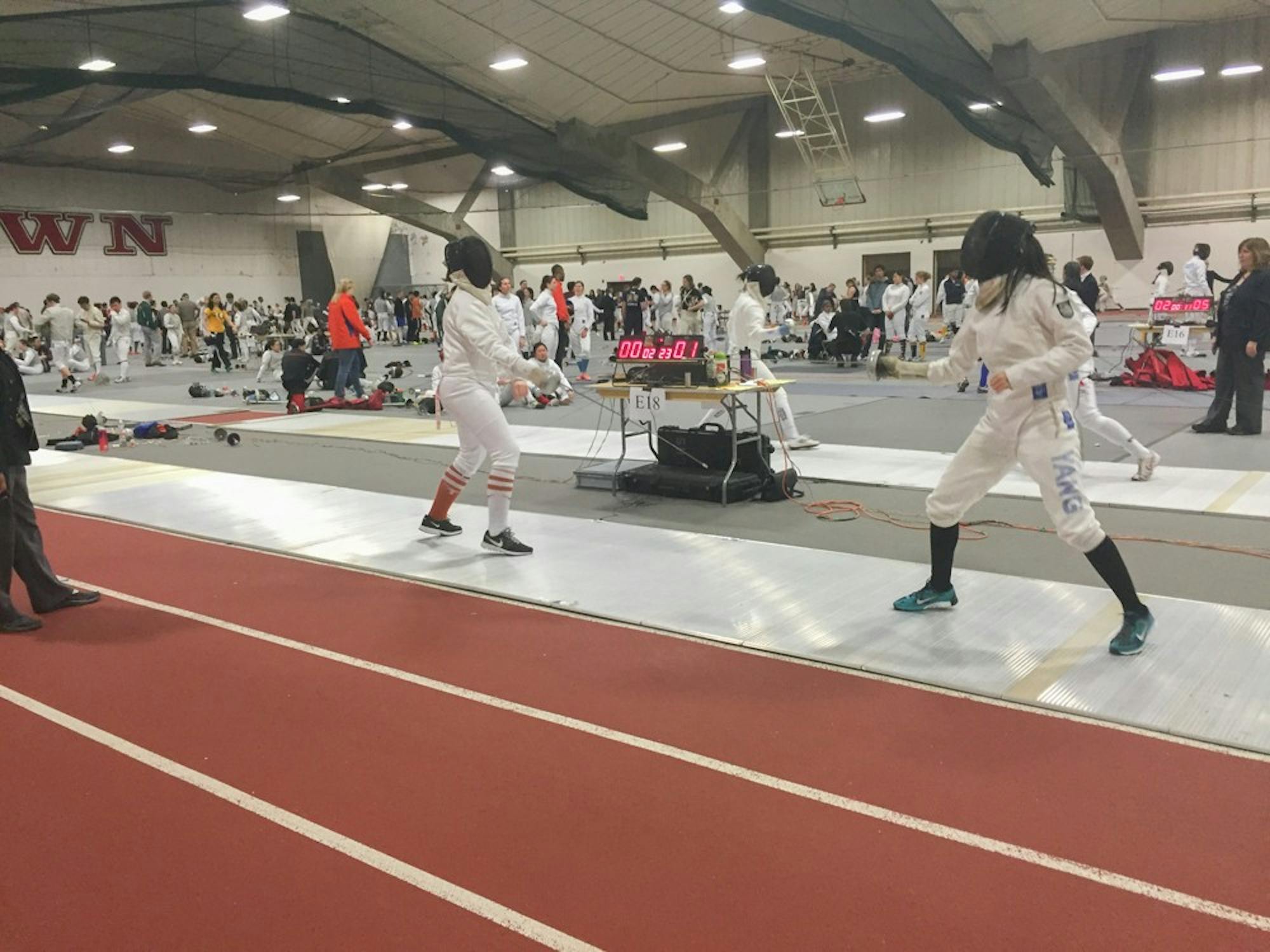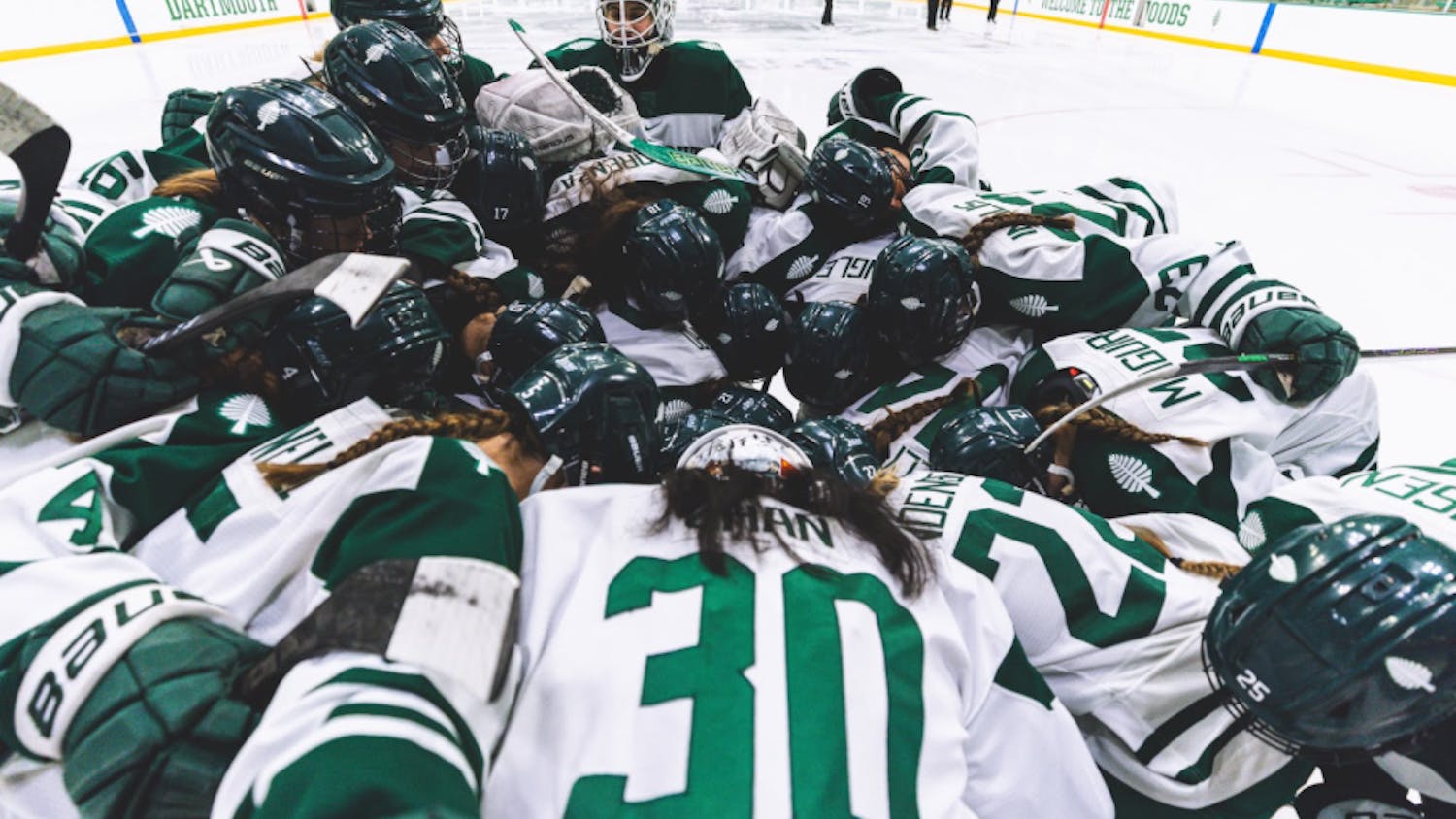From April 2 to April 3, the Dartmouth Fencing Team joined 37 other participating teams to compete in the 2016 USACFC, the largest collegiate fencing event, at Brown University’s Olney-Margolies Athletic Center. The entire team performed extraordinarily across the board, notching a second place finish.
In the overall team score for the six-weapon, Dartmouth finished with totals of 960 for women’s and 500 for men’s to win silver, falling only to the University of Michigan. The outstanding 960 for women’s, divided between 300 for saber, 330 for epee and 330 for foil, was more than enough to win the overall women’s gold. Breaking it down by squad results, the impressive scores in the women’s epee and foil were enough to win gold for both, while the 300 for saber placed the team with bronze. The men’s total score of 500 placed the overall men’s team in a solid 11th place.
“It was really awesome to have the results that we ended up getting during the weekend,” captain Cecilia Lu ’16 said. “I think everyone on the team has been working really hard, coming to every practice, working out on their own throughout the winter and staying after to fence long after practice sometimes. You really saw all of that pay off. Everyone seemed to be on their A-game.”
While women’s saber finished in third place and slightly behind the team’s epee and foil results, the bronze finish marked a dramatic turnaround from two years ago.
“Two years ago, women’s saber squad was the weakest squad on the entire team,” women’s saber squad leader Kaleigh Mentzer ’18 said. “To turn that around into a national medal was pretty exciting. To see my teammates really show up and fence their best when it counted, it was just very satisfying.”
Mentzer also added that Lu played incredible throughout the weekend, placing third in the women’s epee.
One of the key matches for the women’s epee team was against the University of New Hampshire. UNH had knocked out the team last year in the round of eight, but this time the Big Green was able to avenge their loss in the round of four.
“[One highlight was] when our women’s epee squad was fencing UNH,” Lu said. “We have a really great relationship with UNH. They know how we fence, and we know how they fence.”
In the first bout, the Big Green’s C-strip fencer, Acacia Hoisington ’18, won against UNH’s B-strip fencer. Lu added that Hoisington’s win really set a good tone for the rest of the bout, boosting the team’s confidence.
The team also had great success in its individual results. Six out of nine of the competing Dartmouth women made individuals, including the entire women’s epee squad, consisting of Annie Yang ’17, Lu, Hoisington and Mentzer, as well as Phoebe Liang ’17 and Lily Ma ’17. On the men’s side, three out of nine made individuals, including Carter Bartram ’18, James Wen ’19 and Josh Utterback ’17.
Out of the nine Dartmouth fencers who made individuals, five won medals. Bartram finished in fifth place men’s foil, Utterback in third place men’s saber, Lu in third place women’s epee, Liang in second place women’s foil and Mentzer in first place women’s saber.
Mentzer faced the same opponent as in the finals this year as last year, and she was able to prevail again in the close match. Naomi Ngalle from the United States Naval Academy finished in second place in the women’s saber.
“I was fencing the same girl in the finals as last year,” Mentzer said. “That was a fun moment. She is a great competitor.
Mentzer went up 14-8 and ended up winning 15-12, adding that the match was pretty dramatic and stressful, and it was nice to close that out. One of the main reasons the team was able to perform so well was their calm composure throughout the tournament.
“People have called fencing physical chess,” Lu said. “There’s a huge mental component to it, [such as] being able to stay calm in stressful situations, think quickly on your feet and react.”
Lu added that a main reason everyone was able to do so well this past weekend was because they were able to keep that calm mindset in the face of different pressures. As the team competed more, they got used to that pressure and learned different ways to deal with it.
“Some people listen to music, others will hang out and talk to people,” Lu said. “Learning how to manage that stress and channeling it towards fencing is very important.”
The team dynamic was another reason for its success. Though fencers compete as individuals, Lu said that there was a strong team dynamic on the collegiate level.
“You’re cheering your teammates on, winning against schools together, and losing against school together,” she said. “We’re really supportive of each other, not only just the squad and individual weapon but the whole team.”
Lu added that a fencer finishes his or her event, he or she goes on to cheer for the rest of the team.
“It’s funny because people always try to bring and do homework, but it just never gets done because you’re all off running and cheering for everyone else,” Lu said.
Mentzer echoed a similar sentiment about the weekend.
“The team was so supportive of each other,” Mentzer said. “Every touch was just so much cheering. There was so much energy and momentum. It was a great atmosphere.”
Since this was the largest collegiate fencing tournament that featured some of the best fencers, many on the team took this opportunity as a learning experience.
“It was a great learning experience, getting to see experienced fencers from all over and their different techniques,” Daniel Bonitto ’19 said. “You can learn a lot from watching others fence.”
The tournament was also the finale of the season. The fencing team has been a crucial community for both underclassmen and upperclassmen. For many underclassmen, the fencing team has played a crucial role in helping them adjust to Dartmouth life.
“The team felt a lot more like a family that I thought it would,” Bonitto said. “I’m used to hearing clubs say that they’re family, but DCFC (the Dartmouth College Fencing Club) really lives up to it. Whether we’re in the middle of exercises or at social events, we always feel like a group of good friends hanging out and sharing laughs.”
For the seniors, the fencing team community and the bonds formed as a result will remain with them for the rest of their lives.
“I realized after the weekend just how much my four years here have been defined by Dartmouth fencing,” Lu said. “Everyone during their time here will find different communities and click with different ones. I’m just very thankful and grateful that I was able to find mine in Dartmouth College Fencing Club. It’s a very strong and tight-knit community full of supportive people, and the bonds that are formed last long after people graduate or stop fencing.”




